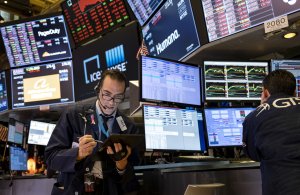Volatility in pandemic is pushing for replatforming core trading and post-trade systems
The findings may be unsurprising as the extreme volatility experienced during the COVID-19 pandemic has challenged much of the current infrastructure to a point of too many trading disruptions taking place across the globe.

A survey commissioned by Nasdaq in partnership with Celent has found that market volatility drives market infrastructure operators to replatform core trading and post-trade systems.
The pandemic acted as a stress test on capital markets infrastructure: exposing data flow, scaling, and operational challenges. The survey found there is increasing demand for more agile technology, microservices, and data models.
Lars Ottersgård, Executive Vice President and Head of Market Technology at Nasdaq, said: “For our survey, we wanted to examine how technology leaders of the world’s markets have navigated rapidly changing technological advancements in the face of modernization challenges.
“The capital markets ecosystem experienced intense volatility and record-high transaction volumes in 2020. In combination with a changing regulatory landscape, evolving market forces, and emerging digital models, our research has shown technology leaders across the industry investing in cloud technology and data analytics specifically to future-proof infrastructure across both traditional and digital asset classes.”
Brad Bailey, Research Director at Celent’s Capital Markets division, commented: “The changing face of the capital markets at a time of accelerated technology innovation have many CIOs thinking about their technology estate and the platforms required to future-proof it.
“The burden of technical debt and inefficient data processes is critical to their internal and external clients. Furthermore, the survey shows considerable differences in where digital change can occur most readily within the various lines of businesses and functional areas that market infrastructures run.”
Chief Information Officers at market infrastructure firms plan to increase their investment in modern technology as they replatform core trading and post-trade systems. The survey expects a 45% increase in the number of MI providers with fully modernized technology stacks by 2025.
Among the 25 CIOs surveyed, 65% see cloud technology as a fundamental and expanding part of their software development. This together with microservices is seen as way to bring more agility to the market. Cloud-ready applications should increase by 21% between 2021 and 2025.
A third of the surveyed CIOs will move more components to third-party providers in the future and 96% report that they are either seriously considering investments in enhanced data analytics or already have projects underway in the area.
The findings may be unsurprising as the extreme volatility experienced during the COVID-19 pandemic has challenged much of the current infrastructure to a point of too many trading disruptions taking place across the globe.
The options market was one of the biggest market movers in 2020 and Nasdaq is leading the options trading boom.
Nasdaq processed more than 365 million options trades and 2.58 billion options contracts in 2020. That trade facilitation involved the passing of 8.88 trillion messages and helped to make 2020 the most active year for options trading since the contracts were introduced in 1973.
What’s more, options volumes rose by a remarkable 52% over the levels recorded in 2019. Nasdaq was the top options trading venue, in terms of volume, for the 11th year in a row.
Nasdaq are justly proud of their achievement and Greg Ferrari, Vice President and Head of Nasdaq Options was quoted as saying that: “The increase in options trading demonstrated to all market participants how Nasdaq technology enhances the price discovery and risk transfer process to meet their investment objectives.”
Retail traders used a number of trading strategies to drive the growth in options trading these included stock replacement, yield enhancement and portfolio protection according to Nasdaq research.
Those same retail traders also embraced shorter-dated weekly options. The sharp increase in the use of short term trading contracts has drawn criticism from Walls Street professionals because such short-dated options have no time value and are therefore dependent upon their intrinsic value. The degree to which they are in or out of the money, and the level of volatility in the underlying, for their valuation.
Options have a finite life of course and many weekly options will expire worthless as a result. In which case an investors entire stake in the position is irrevocably lost. However, the risks involved have obviously not deterred the new generation of US day traders.
Another beneficiary of the renaissance in options trading has been the OCC (formerly known as the Options Clearing Corporation) which is one of the world’s largest derivatives clearing organisations. Over the course of 2020, OCC cleared 7.47 billion options contracts breaking its previous record set in 2018 for 5.14 billion options contracts cleared.
OCC’s volumes were also up sharply when compared to 2019s totals, jumping by 51.20% in terms of total derivative contracts cleared. Whilst the number options contracts cleared by OCC in 2020 rose by 52.40% over the previous year.









